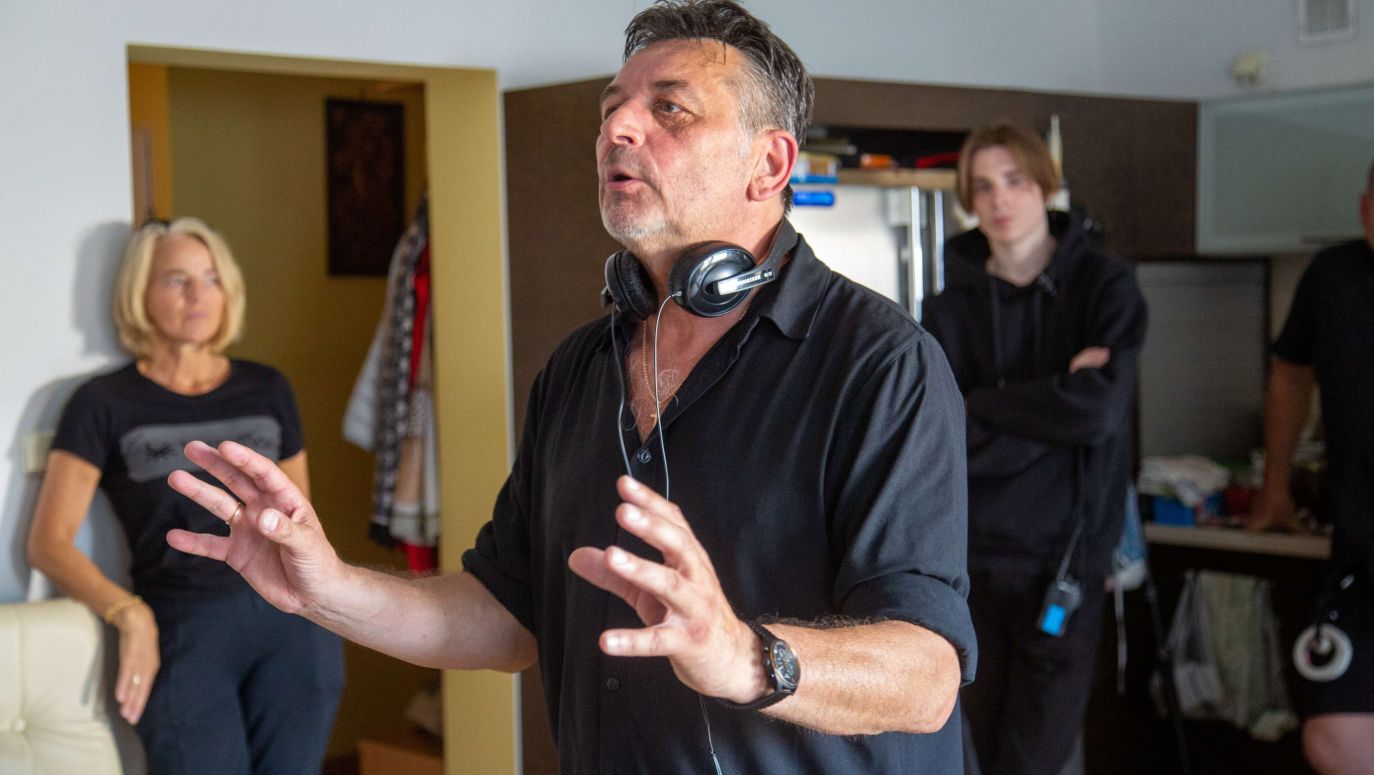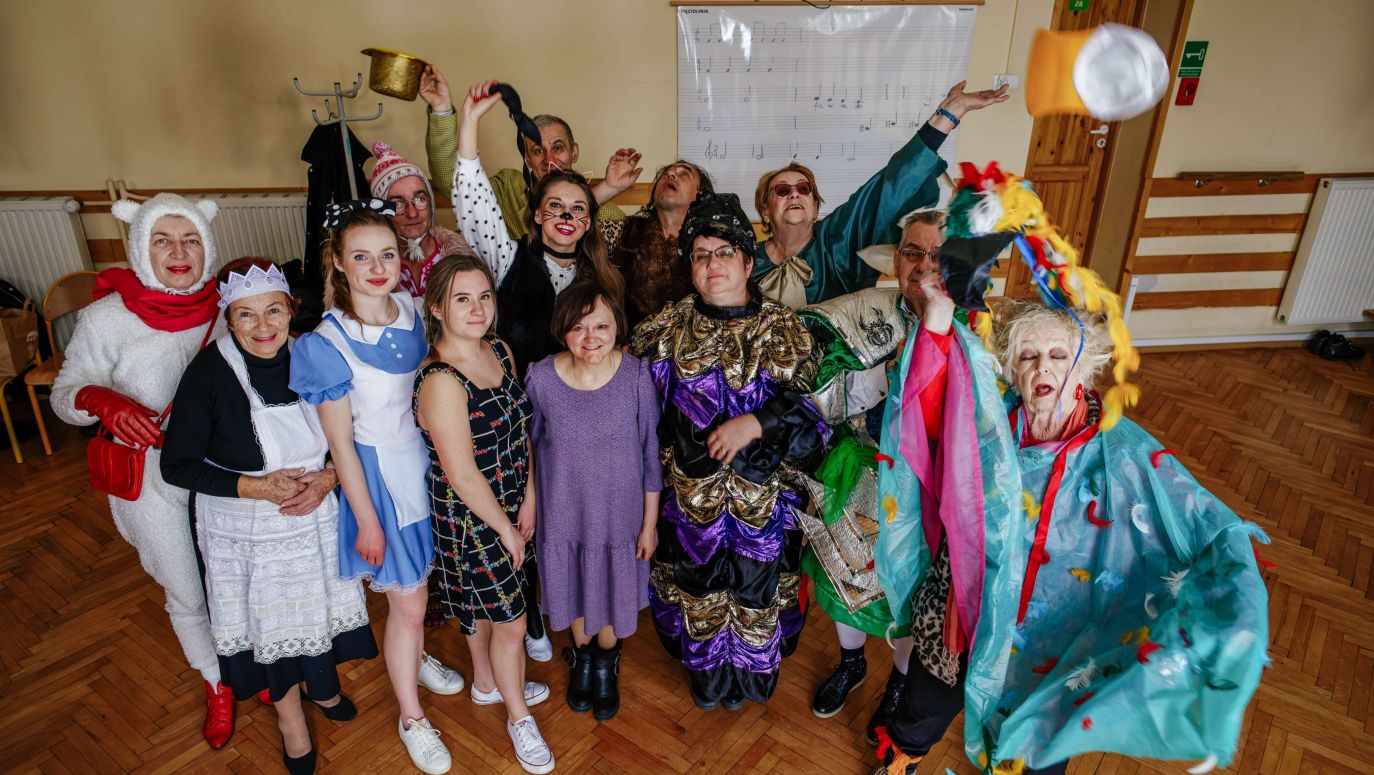From 7 January, the second season of the series 'Passionate', in which blind actors talk about themselves and their theatre, can be seen on TVP 2 every Saturday at 5.20 pm.
The car park in front of the Benedictine Abbey in Tyniec has been busy since morning. Camper, buses, trailers, tables, chairs and benches set up. The electricity generator is humming steadily and people are hurriedly circulating between the dressing rooms, make-up or the film set. Something still needs to be ironed at the last minute, someone's hair styled or an eye painted. Make-up, and not only it, has a hard time coping with the heat pouring down from the sky in July.
The film crew set up in the courtyard of the abbey. Helena Suchan, an actress and moulding specialist with many years of professional experience, mother and grandmother, appears in front of the lens in her Krakow costume. She repeats the scene in which she walks along the wall several times. Behind her is a view of the Vistula. - I didn't have any say in this scene because it goes to the leads," she explains.
I bid her a moment of conversation. - 'And can I braill you first?' - she asks and moves her hands slowly over my face, touching my hair, checking its length. She watches me, but by touch, because Helena Suchan is a blind actress of the ITAN theatre (Inclusive Theatre of the Blind Actor).
And while the Tyniec Abbey has seen many other film crews, the ITAN team is different from all of them. Most of the cast are blind and visually impaired actors. Last year, they shot the second season of the series "The Passionists" here.
 SIGN UP TO OUR PAGE
SIGN UP TO OUR PAGE

The script was written by life itself. The first season told the story of the theatre's actors, their struggle with disability, life's difficulties, work, achievements and commitment to ITAN theatre. - "In the second season, the stories of our actors intertwine, and the protagonist is the entire acting troupe, who struggle to get their own stage and have many adventures along the way," says Danuta Damek, producer, co-writer, but also an actress at the ITAN theatre.
Her life story was the basis for one of the episodes of the first season of 'The Passionate'. We meet her as an accountant who is experiencing problems with her eyesight - although she has undergone surgery, losses in her field of vision remain.
Why this scene?
Where did the theatre for the blind come from? It started more than 20 years ago in Krakow. Artur Dziurman, a theatre, film and dubbing actor, worked on creating an artistic centre, specifically a pub with a stage where plays could be performed and concerts organised. This is how the Molière Stage came into being in premises rented from the city at 4 Szewska Street. - I started this project with a disabled man, Wojtek Tatarczuk, who was in a wheelchair. He said it would be a stage for the disabled, the first disabled theatre in Poland. That was his idée fixe, not mine. When we started the renovation, Wojtek died. I was left alone with the work, with the bureaucracy, with the loan. I saw the renovation through to completion, opened the stage, got the business going. But I kept thinking: "Holy shit, why this stage? What are we going to do here?". Eventually, I came to the conclusion that we had to do as he wanted - integrate the disabled," says Artur Dziurman.
Someone suggested to him that it was a good idea to write a project and apply for funding for artistic activities. The first grant came from the European Social Fund and blind people were to be involved in the play. There were castings, a search for actors by the employment office, and finally, with the people selected for the project, workshops on diction or voice production began. It was necessary to make actors out of a group of people with different educational and professional backgrounds.

 SIGN UP TO OUR PAGE
SIGN UP TO OUR PAGE
 The script was written by life itself. The first season told the story of the theatre's actors, their struggle with disability, life's difficulties, work, achievements and commitment to ITAN theatre. - "In the second season, the stories of our actors intertwine, and the protagonist is the entire acting troupe, who struggle to get their own stage and have many adventures along the way," says Danuta Damek, producer, co-writer, but also an actress at the ITAN theatre.
The script was written by life itself. The first season told the story of the theatre's actors, their struggle with disability, life's difficulties, work, achievements and commitment to ITAN theatre. - "In the second season, the stories of our actors intertwine, and the protagonist is the entire acting troupe, who struggle to get their own stage and have many adventures along the way," says Danuta Damek, producer, co-writer, but also an actress at the ITAN theatre. 






